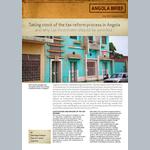Tax builds countries: A window of opportunity for Angola
On the 6th of July, I participated at a conference in Angola, marking the 10th anniversary of The Annual Economic Report by CEIC, a research centre at the Catholic University of Angola (UCAN). Angola has been through profound changes since the first report was launched ten years ago, but the country faces severe challenges raising tax revenue.
Oil-rich Angola is popular with foreign investors and has tried to attract more foreign investments through a favourable tax regime. Such tax incentives undermine the efficiency and effectiveness of the tax system. It creates room for bribery and corruption, increases loopholes for tax evasion and distorts competition. Nonetheless, Angola - like many other African states - keeps offering foreign investors generous tax incentives. But it is the market potential, infrastructure, red tape, political stability and long-term stability, and not the tax system, that are most important for investors According to the World Bank’s Doing Business survey, Angola ranks 172 out of 183 countries.
In March, the government launched an action plan for tax reform. The tax reform aims to simplify the tax system, professionalise tax administration and reduce the number of fees and licenses.
I would recommend the Angolan government to create a new system that has:
- Simple and unambiguous rules
- Clear links between taxes paid and benefits received
- Long-term stability and predictability for investors
- Equal treatment of domestic and foreign companies
There is political will to strengthen the tax system in Angola. If properly designed and implemented, the new tax system can improve the efficiency and responsiveness of the public sector. One of the main challenges, however, will be to convince the citizens of Angola about the value of paying taxes. This will require not only tax reforms, but a major cultural and political shift.
Publications

Taking stock of the tax reform process in Angola, and why tax incentives should be avoided

Análise do processo de reforma fiscal em Angola... e porque incentivos fiscais devem ser evitados
Odd-Helge Fjeldstad
Projects

International Centre for Tax and Development (ICTD)

